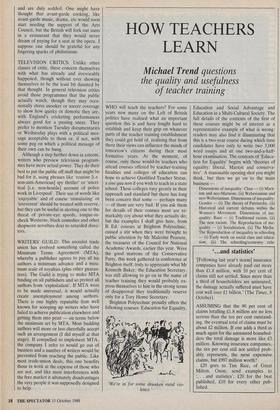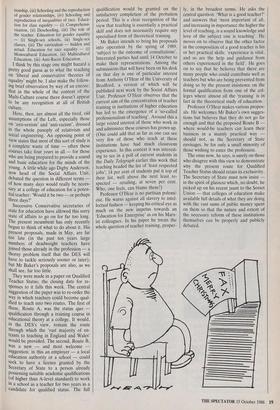HOW TEACHERS LEARN
Michael Trend questions
the quality and usefulness of teacher training
WHO will teach the teachers? For some years now many on the Left of British politics have realised what an important question this is and have fought hard to establish and keep their grip on whatever parts of the teacher training establishment they could get hold of, realising that from there their views can influence the minds of tomorrow's citizens during their most formative years. At the moment, of course, only those would-be teachers who attend courses offered by teacher-training faculties and colleges of education can hope to achieve Qualified Teacher Status, a sine qua non if you wish to teach in a state school. These colleges vary greatly in their approach and standard but there has long been concern that some — perhaps many — of them are very bad. If you ask them for details of their courses most are re- markably coy about what they actually do; but the examples I shall give here, from B. Ed. courses at Brighton Polytechnic, caused a stir when they were brought to public attention by Mr Malcolm Pearson, the treasurer of the Council for National Academic Awards, earlier this year. Were the good matrons of the Conservative Party, this week gathered in conference at Brighton itself, truly to appreciate what Mr Kenneth Baker, the Education Secretary, was still allowing to go on in the name of teacher training they would probably ex- press themselves to him in the strong terms of disapproval they traditionally reserve only for a Tory Home Secretary.
Brighton Polytechnic proudly offers the following courses: Education for Equality,
'We're in for some drunken rural vio- Education and Social Advantage and Education in a Multi-Cultural Society. The full details of the contents of the first of these courses might be of interest as a representative example of what is wrong: readers may also find it illuminating that this is a two-year course during which time candidates have only to write two 3,000 word essays and sit one two-and-a-half- hour examination. The contents of 'Educa- tion for Equality' begins with 'theories of equality: liberal, Marxist and conserva- tive'. A reasonable opening shot you might think, but then we go on to the main business -
Dimensions of inequality: Class — (i) Marx- ism and neo-Marxism, (ii) Weberianism and neo-Weberianism. Dimensions of inequality: Gender — (i) The theory of Patriarchy, (ii) Historical and current debates within the Women's Movement. Dimensions of ine- quality: Race — (i) Traditional racism, (ii) The new racism. The Reproduction of ine- quality — (i) Socialisation, (ii) The Media. The Reproduction of inequality in schooling — (i) Early work on social class and educa- tion, (ii) The schooling/economy rela- tionship, (iii) Schooling and the reproduction of gender relationships, (iv) Schooling and reproduction of inequalities of race. Educa- tion for class equality — (i) Comprehensi- visation, (ii) Deschooling. (iii) The role of the teacher. Education for gender equality — (i) Single-sex schools, (ii) Single-sex classes, (iii) The curriculum — hidden and actual. Education for race equality — (i) Monocultural Education, (ii) Multicultural Education, (iii) Anti-Racist Education.
I think by this stage one might hazard a pretty good guess as to what the teaching on 'liberal and conservative theories of equality' might be. I also make the follow- ing brief observation by way of an encore: that in the whole of the content of the Multi-Culture course there doesn't appear to be any recognition at all of British culture.
Here, then, are almost all the tired, old assumptions of the Left, especially those on 'anti-sexism' and 'anti-racism', dressed In the whole panoply of relativism and social engineering. An opposing point of view states that most of this sort of study is a complete waste of time — often these courses take four years in all — for those who are being prepared to provide a sound and basic education for the minds of the Young. A little while ago Digby Anderson, now head of the Social Affairs Unit, debated the question in different terms of how many days would really be neces- sary at a college of education for a poten- tial teacher: 'Would it be two — or perhaps three days?'
Successive Conservative secretaries of state for education have allowed this sorry state of affairs to go on for far too long, The present incumbent has only recently begun to think of what to do about it. His present proposals, made in May, are far too late (in the past ten years large numbers of deadweight teachers have joined those already in the profession — a thorny problem itself that the DES will have to tackle seriously sooner or later); but Mr Baker's proposals are also, as we shall see, far too little.
They were made in a paper on Qualified Teacher Status; the closing date for re- sponses to it falls this week. The central suggestion of the paper was to re-order the way in which teachers could become qual- ified to teach into two routes. The first of these, Route A, was the status quo qualification through a training course in educational theory at a college. It would, In the DES's view, remain the route through which the 'vast majority of en- trants to teaching in England and Wales' would be provided. The second, Route B, was a new — and most welcome — suggestion: in this an employer — a local education authority or a school — could seek to have a licence granted by the Secretary of State to a person already possessing suitable academic qualifications (of higher than A-level standard) to work In a school as a teacher for two years as a candidate for qualified status. The full
qualification would be granted on the satisfactory completion of the probation period. This is a clear recognition of the view that teaching is essentially a practical skill and does not necessarily require any specialised form of theoretical training.
Mr Baker intends to bring his proposals into operation by the spring of 1989, 'subject to the outcome of consultations'. Interested parties had until 14 October to make their representations. Among the submissions that will have been on his desk on that day is one of particular interest from Anthony O'Hear of the University of Bradford, a version of which will be published next week by the Social Affairs Unit. Professor O'Hear observes that the current aim of the concentration of teacher training in institutions of higher education has led to the emergence of a 'so-called professionalism of teaching'. Around this a large vested interest of those who work in and administer these courses has grown up. (One could add that as far as one can see very few of those who teach at these institutions have had much classroom experience. In this context it was interest- ing to see in a poll of current students in the Daily Telegraph earlier this week that teaching headed the list of 'least respected jobs'; 14 per cent of students put it top of their list, well above the next least re- spected — retailing, at seven per cent. Who, one feels, can blame them?) Professor O'Hear is no partisan polemi- cist. He warns against all slavery to intel- lectual fashion — keeping his critical eye as much on the new impetus towards an 'Education for Enterprise' as on his Marx- ist colleagues. In his paper he treats the whole question of teacher training, proper-
ly, in the broadest terms. He asks the central question: 'What is a good teacher?' and answers that 'most important of all, and increasing in importance the higher the level of teaching, is a sound knowledge and love of the subject one is teaching'. He moves on to observe that the other factor in the composition of a good teacher is his or her practical skills: 'experience is vital, and so are the help and guidance from others experienced in the field'. He goes on to say that he believes that there are many people who could contribute well as teachers but who are being prevented from doing so by the present insistence on the formal qualification from one of the col- leges where almost all the 'training' is in fact in the theoretical study of education.
Professor O'Hear makes various propos- als. He welcomes Mr Baker's own sugges- tions but believes that they do not go far enough and that the proposed Route B where would-be teachers can learn their business in a mainly practical way should not, as the Secretary of State envisages, be for only a small minority of those wishing to enter the profession.
The onus now, he says, is surely on those who disagree with this view to demonstrate why the present route for Qualified Teacher Status should retain its exclusivity. The Secretary of State must now insist in the spirit of glasnost which, no doubt, he picked up on his recent jaunt to the Soviet Union — that colleges of education make available full details of what they are doing with the vast sums of public money spent on them so that the nature and extent of the necessary reform of these institutions themselves can be properly and publicly debated.



























































 Previous page
Previous page